
The desert locust is a species of locust, a periodically swarming, short-horned grasshopper in the family Acrididae. They are found primarily in the deserts and dry areas of northern and eastern Africa, Arabia, and southwest Asia. During population surge years, they may extend north into parts of western Spain and southern Italy, south into Eastern Africa, and east in northern India. The desert locust shows periodic changes in its body form and can change in response to environmental conditions, over several generations, from a solitary, shorter-winged, highly fecund, non-migratory form to a gregarious, long-winged, and migratory phase in which they may travel long distances into new areas. In some years, they may thus form locust plagues, invading new areas, where they may consume all vegetation including crops, and at other times, they may live unnoticed in small numbers.

Kosher locusts are varieties of locust deemed permissible for consumption under the laws of kashrut. While the consumption of most insects is forbidden under the laws of kashrut, the rabbis of the Talmud identified eight kosher species of locust. However, the identity of those species is in dispute.

Schistocerca nitens is a species of grasshopper known by several names, including vagrant grasshopper and gray bird grasshopper. It is a close relative of the desert locust, which is in the same genus. This grasshopper is native to southern North America including Mexico and the south-western United States from California to Texas. Can also be found in parts of mid-Atlantic states. Recently found on Long Island, New York. It is also present in parts of Central America. It lives in many habitats including desert, woodland, and lower elevation mountainous areas. It is a large grasshopper, reaching lengths of 4 to 7 centimeters. It is mostly brown and gray spotted or patched in cryptic coloration. This species is known as a pest on ornamental plants and many types of crop plants.

Schistocerca is a genus of grasshoppers, commonly called bird grasshoppers, many of which swarm as locusts. The best known species is probably the desert locust and trans-Atlantic flight may explain the biogeography of some locust species.

Metarhizium acridum is the new name given to a group of fungal isolates that are known to be virulent and specific to the Acrididea (grasshoppers). Previously, this species has had variety status in Metarhizium anisopliae ; before that, reference had been made to M. flavoviride or Metarhizium sp. describing an "apparently homologous and distinctive group" of isolates that were most virulent against Schistocerca gregaria in early screening bioassays.
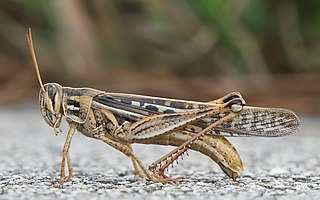
Schistocerca americana is a species of grasshopper in the family Acrididae known commonly as the American grasshopper and American bird grasshopper. It is native to North America, where it occurs in the eastern United States, Mexico, and the Bahamas. Occasional, localized outbreaks of this grasshopper occur, and it is often referred to as a locust, though it lacks the true swarming form of its congener, the desert locust.
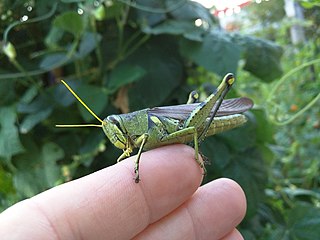
Schistocerca alutacea, the leather-colored bird grasshopper, is a species of grasshopper in the family Acrididae. The species occurs in the United States, from Massachusetts to Arizona and Florida.

The Cyrtacanthacridinae are a subfamily of Orthoptera: Caelifera in the family Acrididae. They are sometimes referred-to as bird locusts, criquets voyageurs in French-speaking Africa, and Knarrschrecken in German.
Schistocerca ceratiola, the rosemary grasshopper, is a species of bird grasshopper in the family Acrididae. It is found in North America.
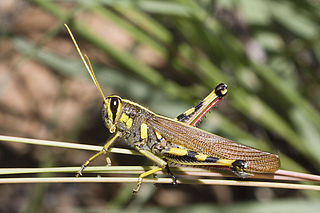
Schistocerca albolineata, the white-lined bird grasshopper, is a species of bird grasshopper in the family Acrididae. It is found in North America, often near the U.S.-Mexico border.

Schistocerca rubiginosa, the rusty bird grasshopper, is a species of bird grasshopper in the family Acrididae. It is found in North America and South America.
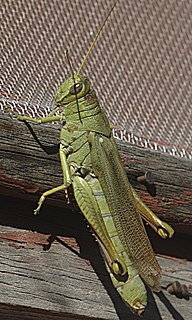
Schistocerca shoshone, known generally as the green bird grasshopper or green valley grasshopper, is a species of bird grasshopper in the family Acrididae. It is found in North America.

Schistocerca lineata, known generally as the spotted bird grasshopper or birdwing grasshopper, is a species of bird grasshopper in the family Acrididae. It is found in North America.

Schistocerca damnifica, known generally as the mischievous bird grasshopper or Carolina locust, is a species of bird grasshopper in the family Acrididae. It is found in North America.
Platynus cohni is a species of ground beetle in the family Carabidae. It is found in North America.

Schistocerca piceifrons is a large locust in the subfamily Cyrtacanthacridinae: Acrididae. There are two subspecies. S. p. piceifrons is sometimes called the Central American Locust and S. p. peruviana is sometimes known as the Peruvian Locust.

Schistocerca cancellata is a species of locust in the subfamily Cyrtacanthacridinae. It is the major swarming species in subtropical South America. This species shows typical locust phase polymorphism. Solitarious nymphs are green, but gregarious ones are yellow with a black pattern. There are morphological differences between solitarious and gregarious adults. For many years the two phases were believed to be different species and the gregarious form was mistakenly identified as S. paranensis. The solitary phase is found in South America between 18°S and 35°S. Plagues originate in a desert and semi-desert zona permanente in NW Argentina, SE Bolivia and W Paraguay, when good rains allow successful breeding, followed by gregarisation. Swarms of gregarious adults may then migrate into crop growing regions.

Schistocerca pallens is a large “bird grasshopper” in the subfamily Cyrtacanthacridinae that occurs throughout tropical America. It is closely related to Schistocerca cancellata but shows no swarming behaviour or locust phase polymorphism, even under crowded laboratory conditions. Although not a swarming locust, it can occur at sufficiently high densities to cause economic damage. It is mainly a pest of sugar cane, but has also been recorded as damaging almond, banana, beans, breadfruit, carnauba wax palm, chickpeas, coconut palms, cotton, forage crops, groundnuts, indigo, legumes, maize, onions, rice, sorghum, sweet potato and tomatoes.

Schistocerca flavofasciata is a species of bird grasshopper in the family Acrididae. It is found in South America.
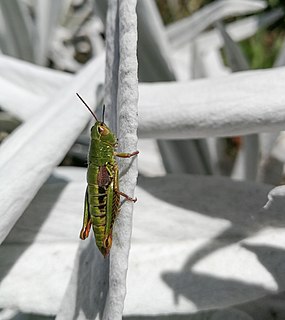
Jivarus is a genus of spur-throated grasshoppers in the family Acrididae. There are more than 20 described species in Jivarus, found in Ecuador, Colombia, and Peru.


















